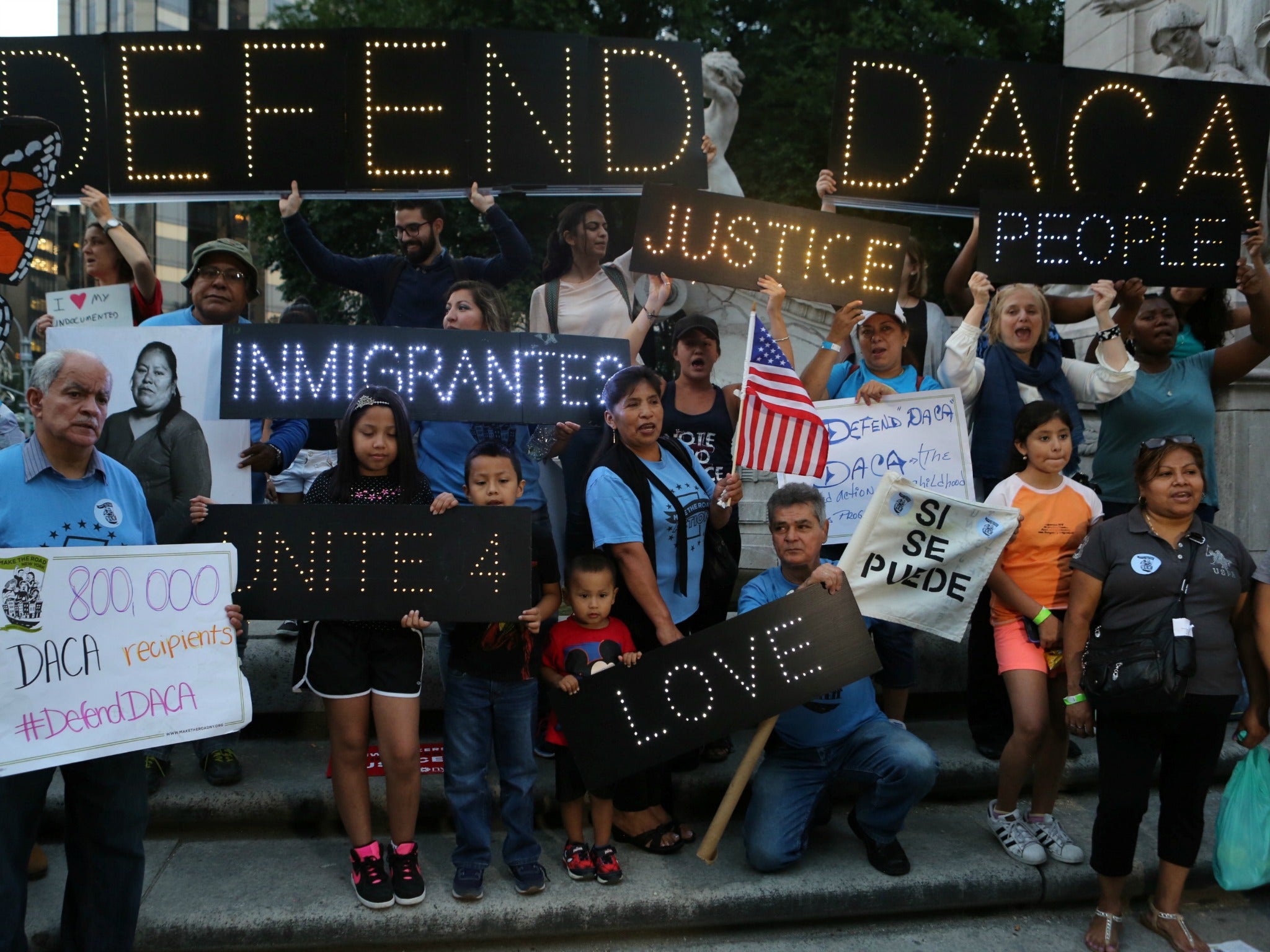'This is where I belong': Meet the Dreamers facing a nightmare as Trump scraps Daca
One Dreamer says Mr Trump's decision has cost him 'some kind of future'

Before the announcement that has thrown his life into disarray, Edward had been exploring some options to secure his future in America: marriage or the military.
Born in Mexico but raised in Texas, where his mother took him after their neighbours were murdered in the city of Reynosa, Edward has been able to work legally and attend college under the auspices of the Deferred Action for Childhood Arrivals (Daca) programme, a scheme initiated by former president Barack Obama, which offers work authorisation and protection from deportation to undocumented immigrants who arrived as children and have clean criminal records.
But since Donald Trump’s election, the fear that Mr Trump would follow through on a campaign promise to dissolve Daca has brought fresh upheaval to a life already fractured by the Rio Grande river. Edward, who asked that his full name not be used to protect his undocumented mother, has explored enlisting in the armed forces or marrying someone with legal status as a way to preserve the stability Daca lent his life.
That feeling can be multiplied tenfold now that rumour has become fact and the programme is being phased out.
“We’re just tired of living this way,” Edward said. “I used to have at least a very slight trust in the government that they wouldn’t do anything horrible to me or my family,” he added, “but now...”
Since winning the presidency on a hardline immigration platform, Mr Trump vacillated on the fate of the 800,000 people who have won Daca status, pincered between a hardline immigration base urging him to end Daca, and pleas from business leaders and members of his own party to protect it. As recently as Friday, he said that “we love Dreamers”, using a term for young immigrants, calling them “terrific”.
But that will be of little comfort to people like Edward.
The average age of ‘Dreamers’ is 25, according to a recent survey of Daca recipients conducted by a University of California, San Diego, professor. Many have spent decades in America: on average, they arrived here when they were six-and-a-half. Nearly three-quarters have a spouse, a child or a sibling who is an American citizen.
Nearly all of them, or 91 per cent, said they are employed, compared to less than half before Daca, and two-thirds said they have been able to pursue educational opportunities they could not before. Mr Trump’s decision imperils those gains.
“It’s life-changing, especially for those who have had that benefit and have had it ripped away,” said Katie Mullins, a staff attorney at a San Antonio branch of the Refugee and Immigrant Center for Education and Legal Services. “Even if they are safe in some sense of the word, even if Ice [Immigration and Customs Enforcement] doesn’t try to deport them, they’re back in limbo with no opportunity to work, no opportunity to better themselves… they want to work, they want good jobs, they want to go to nursing school. You can’t do any of that without a work permit.”
Immigration attorneys and service providers have been preparing for months. They have been advising Daca recipients of their constitutional rights, reminding them that they do not have to let government representatives into their homes or answer questions during traffic stops, and urging them to explore if they are eligible for other types of visas. If the government does not take your work permit, immigrants have been told, keep doing your job.
Since the election, the San Francisco-based Immigrant Legal Resource Center has handed out more than one million cards offering legal guidance, said deputy director Sally Kinoshita.
“This is something we’ve been concerned about since January, when he was inaugurated,” she said.
As rumours about the fate of Daca have rippled through immigrant communities, Ms Kinoshita said the reactions have varied. Some people refuse to be cowed, even making plans to travel outside the country. Others are planning to move to different homes out of fear they will be targeted using the information they submitted to apply for Daca.
“For the people who already have [Daca status] the tough thing is, am I going to get a new apartment? Am I going to move? Do I need to go back into the shadows?” said Ms Mullins.
In response to a question about how identifying details of Daca recipients might be used, a spokeswoman for Ice said that the agency “prioritises its resources to focus on individuals who pose a threat to national security, public safety and the integrity of our international borders”.
“However, as Ice’s acting director has made clear, the agency does not exempt classes or categories of removable aliens from potential enforcement,” spokeswoman Virginia Kice said in an email. “All those who are in the US in violation of our immigration laws may be subject to immigration arrest, detention and, if found removable by final order, to removal from the US.”
Even advocates have warned of the consequences of Daca ending - many have adopted a stance of defiance. It was advocacy that prodded Mr Obama to enact Daca after efforts at an immigration bill stalled, they argue, and they say that type of activism must continue even at risk of people forfeiting the lives they have built in America.
Edward has no intention of leaving. “I grew up in this country,” he said. “This is where I am, this is where I belong.”
He and his siblings survived before Daca, he said, and they will do it again, though he worries about his ailing mother and her limited English. But he betrayed some weariness in describing what the end of Daca might cost him.
“Just having some kind of future”, Edward said.
Join our commenting forum
Join thought-provoking conversations, follow other Independent readers and see their replies
Comments